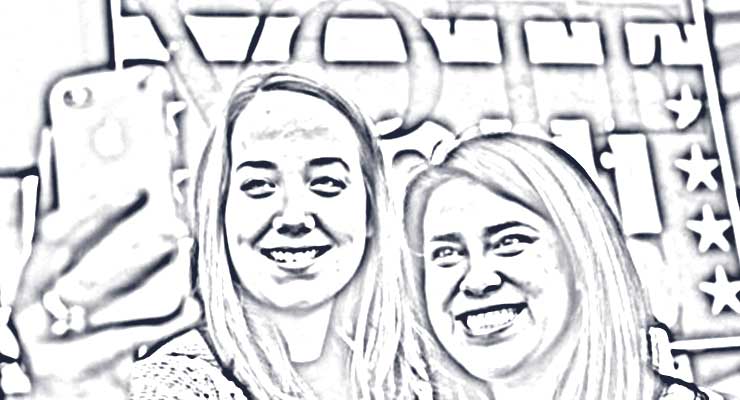
Voters in the United States are getting ready to go to the polls two weeks from today. Over a hundred million Americans have been busy making sure that they are properly registered and meet all the proper requirements. As they do, they should be aware of the fact that some states are implementing or already have implemented laws that would make it illegal to take selfies inside the voting booth. Although seemingly an innocuous practice, a very interesting and modern discussion on election law has been ignited that touches on issues of new technologies, privacy, voter intimidation, free speech and more
One of these states that implemented such a ban is New Hampshire which enacted a selfie ban in 2014 right before the primary elections. But the ban has been in legal limbo over implementation since 2014 when the law was first passed. “The ballot selfie prohibition is like burning down the house to roast the pig,” judge Sandra Lynch wrote regarding her opposition to the ban.
Ms. Lynch is part of a three-judge panel that is hearing a case involving a New Hampshire voter who is being investigated for taking a selfie in the voting booth and live-posting it to Facebook during the 2014 Republican Primary elections. According to a 1979 New Hampshire state law, it is illegal for a voter to photograph and to show the photograph or actual ballot to someone else.
“The First Amendment does not allow the state to as it was doing here, broadly ban innocent political speech with the hope that such a sweeping ban will address underlying criminal conduct” ACLU lawyer, Gilles Bissonnette said regarding the law and his client, Andrew Langlois. Mr. Langlois is the New Hampshire voter being investigated for snapping a selfie during the 2014 New Hampshire Republican primary.
35 states have laws prohibiting selfie from being taken inside the voting booth, while other states have existing laws that have already prohibited citizens from taking photos of their vote.
Some social media companies like Snapchat have been attempting to have the state bans on taking selfies with filled-out ballots repealed. Many in the tech community feel that the practice could help increase user participation, since the practice is widespread among millennials. In accordance with the updated New Hampshire law, it is illegal for a voter a voter to take a photo inside the booth and if caught doing so, the voter faces the risk of getting a $1,000 fine.
“There is no more potent way to communicate one’s support for a candidate than to voluntarily display a photograph of one’s marked ballot depicting one’s vote for that candidate” a statement from the ACLU New Hampshire read.
Another incident involving the selfie ban in New Hampshire involves Leon Rideout, a now former member of the New Hampshire House of Representatives. Mr. Rideout brought the topic to the forefront when he took a photo of his ballot for the primary in 2014 and posted it to his twitter account. Mr. Rideout is a now former Representative because of his failed attempt at a Senate candidacy.
The posting resulted in him getting a call from the New Hampshire General Attorney’s office, threatening legal action. Rep. Rideout said that the ruling was a crucial one for the younger generation, because social media is “particularly important for the younger generation because their way of communicating is primarily through social media.”
A Changing Landscape
States with the toughest anti- selfie ballot laws, include, Alabama, Arkansas, Georgia, Massachusetts, Minnesota, Oklahoma, Tennessee, Texas, Vermont, Virginia, Alaska (in the Republican caucus only), Colorado (in the Democratic Caucus only) and New Hampshire.
On Wednesday September 28th, however, a New Hampshire Appeals Court reversed the ban ruling that the law violated free speech. “Today’s ruling is a victory for free speech in the digital age” Chris Handman, said. Mr. Handman is part of the general counsel for Snapchat.
The topic has brought about a union of strange political allies as some Republicans have come together with ACLU representatives in an attempt to help loosen the punishment for the practice.
“It was sort of a protest photo” Mr. Rideout continued.
The main objection to voting selfies is that it could be taken advantage of by those seeking to influence other voters. For example, an employer who promises to punish employees who vote for a certain candidate can require them to take a photo of their filled out ballot as proof of the employees’ compliance. Is the secret ballot at threat?
In my opinion, states should be making it easier for people to exercise their obligation to vote and to allow for them to post and share the excitement of casting their ballots without having to fear any type of unreasonable punishment. The benefits outweigh the risks here.
Selfie Voting Sources:
- Time.com Link: https://time.com/3556228/ballot-selfies-instagram-twitter-photos/
- Boston.com Link: https://www.boston.com/news/politics/2016/09/13/how-a-ballot-selfie-went-from-a-new-hampshire-voting-booth-all-the-way-to-federal-court
- Salon.com: https://www.slate.com/articles/technology/future_tense/2016/09/voting_booth_ballot_selfie_bans_violate_the_first_amendment.html
- Fusion.net: https://fusion.net/story/275491/instagram-ballot-illegal-states/
Leave a Reply